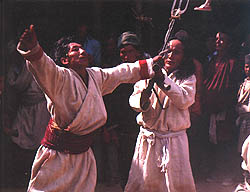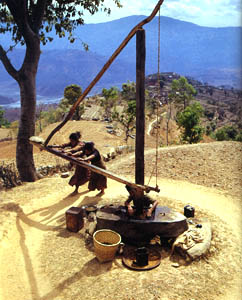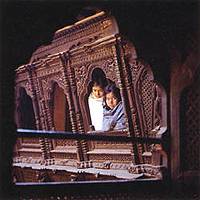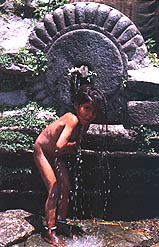|
Living
in Nepal - What it's like after 1.5 years
Another question (OK many questions), what is daily life like in Nepal? Well, the first thing to say about life in Nepal is how I ended up here. Like many expats that I've met, things just kind of fell into place. Originally, the idea was to trek. One of those unexpected Nepal-based miracle things happened, when my traveling companion and I met an astrologer on the side of the lake in Pokhara after our trek. I had a 'reading' and the next day she had a 'reading'. Along with 10 out of 12 other coincidences predicted by this astrologer that have come true, we were married. I've found stories similar to this all over Kathamndu. The country has a little over 22 million people and over 1 million live in this capital city. I'm told the expat community is around 3,000 - that seems small to me? Many of these expats are working for the giant organizations drawn to the country by the greatest contributor of Nepal's economy - foreign aid. This is a long story, but many of these people seem to be highly educated (an MBA seems to be one of the requirements for work). Imagine the world's 3rd poorest nation with some of the world's most educated people. You'd be surprised at who's educating who. But, then there's another side to the expat community. Yes, the old hippies from bygone days and the spiritual seekers - definitely some overlap with these two groups. Did you know the Peace Corp was set up to harbor the USA intelligent community from the Vietnam war? Ok, maybe not exactly, but these folks are old-timers to Nepal and they have some great stories. Do you get up in the morning and have coffee or what? We're up after the traffic starts outside our door (8 to 9 AM - this is REALLY late for Nepal). We drink Nepali and Indian tea (chia), organic-Nepali tea, herbal Nepali tea that's growing in the export markets and coffee (sometimes) grown somewhere in the Himalaya's. If you come to visit for 2 weeks, I promise we (or our Didi/sister/maid) will never serve you the same tea twice. What do you eat? What do the natives eat? These were the killer questions for us (especially me) for the first year. Assimilation into Nepali life means lots of intestinal problems and everyone has their story. The locals eat (rice, lentils, vegetables and relishes/pickle) called dal, baht, tarkari. A poor nation means poor food. Only 2 days ago we had and party with a BIG group of our Nepali friends and last night I spent it in the bathroom. This was the first time to eat outside our home in a long time and I paid the price. We've got 10 to 30 restaurants that cater to expats' need for hygiene - this is a LONG training process. We have also find a complete collection of western food products that are imported. I'm doing wonders with Campbell's Soap dishes in the kitchen. One part of the foreign assimilation into Nepal that's already taken place, was to bring in food processing that's up to Western standards. An expat can live for $200 a month here if they want to budget. For $500 per person (especially if you're two), you can live a VERY high life style, even by Western standards. We spend $500 only on food, so we're living it up. I think about my grandmother and her garden-style cooking in East, Texas everyday. I'm cooking just like she did. Something to be said for having time to cook, huh? And, yes, we have a garden and gardener. Lots of fresh food in Nepal, but I hear that 95% of all food products come from India. In the hills, the life style is totally based on subsistence living. Who are the natives? What is the prevalent religion and form of worship? I assume the native people worship somebody. You ask 2 questions, but really the answer needs to be put together. The basic Nepali lifestyle is synonymous with worship. This is a country of religious tolerance, but they put people in jail ,or kick them out of the country, if they start 'preaching'. The Hindu (Nepal is the only Hindu country in the world) and Buddha followers share the same gods with different names. The country is covered with temples. I can walk 5 to 15 minutes in any direction from home and I'll be at a temple (and, we're in the middle of one of the high-end residential areas.) I looked into the festivals of Nepal for our website and found 100's during all times of the year. 5 different New Years celebrations take place here from different cultures. I almost forgot Thanksgiving this year because we had just finished almost 1.5 months of solid celebrations. Now, we just finished the marriage season for one group, but another group starts next month. Marriages are GIANT affairs with everyone from the family, their friends and the entire surrounded community are invited. On the invitations, that are usually hand delivered (their are no addresses or street names in Kathmandu), their is a time to show up for each group. Because so many people are invited, they have to feed them in rotation. Nepal has over 30 ethnic groups here and at least that many languages. Nepali, Hindi (Indian), and Nawari (large ethnic group in Kathmandu) are dominate. I've met more people that speak 3 to 6 languages than anywhere else. All, usually understand tourist-based English. This is a big topic, but one interesting thing because Nepal has 8 of the world's tallest mountains. I saw one drawing depicting where different ethnic groups come from based on elevations - really interesting! The average, yearly per capita income is $120. The city is much higher than this. A houseperson used to cook and clean makes less than $50 per month. A guard and/or gardener makes about $25 per month. A government employee with 10 years experience makes $75 per month. A computer programmer with 2 years experience can make $120 to $250 a month. The high end computer person makes $450. Expats working for the local American school make $2,000 monthly with a $500 housing allowance. How about that for USA, underpaid teachers. The ones that travel to other countries (this is an interesting demographic group), become the fat-cats of developing nations. Can you imagine what these people live like that work for foreign aid projects at $5,000 or more per month when a comfortable living may be had for $1,000? What is the climate like where you live? Nepal has 3 major areas based on elevation - high mountains, mid-lands (valley) and low-lands (Terai). We are in Kathmandu which is in the mid-land valley. It dropped to freezing just the other night (Dec 15th), but this is not too usual. There's no snow in Kathmandu, but it snows every year on the some of the hilltops that are 1 hour drive outside the city. We have a monsoon season that is also about 3 months. They call Nepal the country of extremes, so you have a little of everything. No ocean though and no ski lifts (yet). After 10 years of Californian lifestyle, I'm feeling I'd like to travel outside the country during one month of monsoon and one month of winter to break up some of the extremes. We trekked during monsoon and sat around the lake. It was the low season and I was amazed. Part of setting up the VisitNepal.com website was to break the paradigm of everyone coming here in Oct-Nov just see the mountains. This is crazy. Nepal has so much to offer any time of year. Now, one advertising campaign is "Nepal for All Seasons." This is certainly true, except for what I mentioned above. Where do you live? Do you rent it? Our rent is high by Nepali standards ($250 - 15,000 Nepal Rupees), but we have a great location for mine and Diana's work and we have a great compound. We have a badminton net up in the front yard. We get sun from sun-up to sun-down. It's a 2 bedroom place with a sun-room, dining room, living room, big kitchen, garage, storage house, chokidar (guard) house, and our roof has a great sitting area. We have a field nearby to expand the garden, if we need.
There is no sewage treatment anywhere in Nepal. 22 million people contribute to the waterways that usually dump into the Ganges of India. The one facility that was built for millions of foreign aid dollars was never turned on because the neighbors where convinced it would stink. People use the toilet and bath in public here, but with a lot of modesty. Do you speak the native language? I worked with my Nepali gardener today for practice. Over the last 2 to 3 months, after getting our Business Visa's that let us live in the country, I took a tutor for 1 hour - 2 times a week. Now, I have a big vocabulary, but need practice to work on creating sentences. I'm amazed when I meet people that have been here 5 years that don't know the language. I don't want to be like that. We spend more time with Nepali's than expats anyway. And, of course, I'm learning music, how to cook and how to break the American materialistic paradigm. We have 75% of our time free here; only 25% or less is used for work. What sort of justice and legal system is in place? Ugh! Don't want to get started on this one. Six or eight years ago, Nepal went from a Constitutional Monarchy to a Democracy (King with a 2 party house). They had the longest government (6 months, I think) since we've been here dissolved yesterday by a no-confidence vote. There's been 8 or 10 governments since democracy was voted in. Now, there's a Maoist contingent killing police and politicians outside the cities. The government keeps rounding them up and killing them in retaliation. They US State Department uses this to scare expats - don't travel and see the world, keep your dollars here, etc. There are 3 political parties that keep shuffling around, so there's not enough for a majority. The idea here is to be the majority and have the right to appoint Ministers to key positions to give you power. We have something called Nepal Bhand (strike) that's called by various political parties on a whim. This closes down the city and makes biking (with no smog) great for a day. They rally Nepali students to give support for this kind of political game playing. Some say there could be revolution (I don't know whom the leaders would be) and the King would have the ability to come back into power. Many business people I talked to seem to want that, because it was easier to get things done by have one person to pay off. Now, if you want to bribe a government official/minister, you don't know if he'll be in office to support you the following day. Get the idea. Oh! It's not really 'bribery' here. When you work 10 to 20 years in government for less than $100 per month, you are ready to sit in the big sit to collect your retirement from people that need help. People do not say 'No' in Nepal. Maybe, they are like the Asians that don't want to lose face or take responsibility for a decision. They have this way of nodding their heads making a bobbing, figure 8 motion. It's great when your partner's nagging you about something or you're approached on the street from a hawker trying to sell you something. This makes for interesting business and politics. Since, it's part of the culture, you have to learn how to read people. That's what I have found living in Nepal to be all about. When you shut your brain, you are only left with feeling and intuition. That's why I believe the popular phrase - Don't try to change Nepal, let Nepal change you. And... how true it has become for me. To contribute information or become a sponsor, please contact us.
|
|||||||||||||||||||||||||||||||||||||||||||||||||||||||||||||

 Here
are a few answers to questions from a friend living in the USA.
Here
are a few answers to questions from a friend living in the USA. Life
is still based on the agricultural standard - it starts with the
sunrise. Just 10 minutes outside the city, by bicycle, you
can experience still experience life-styles from the stone age,
iron age and everything in-between. Some groups will not use
animals to plow the field and more remote villages still use wooden
implements.
Life
is still based on the agricultural standard - it starts with the
sunrise. Just 10 minutes outside the city, by bicycle, you
can experience still experience life-styles from the stone age,
iron age and everything in-between. Some groups will not use
animals to plow the field and more remote villages still use wooden
implements. We
live in a house in Kathmandu about 10 minutes from the Royal Palace
that's at the center of the city. Kathmandu is really made
of of 3 old cities. The house we rent from a Nepali man that
is truly amazing. He has photo's in his house back to his great-great
grandfather. His home is like a museum. In the garden,
are 150 year old Chinese vases that were brought over the Himalaya's
on the backs of porters umpteen years ago.
We
live in a house in Kathmandu about 10 minutes from the Royal Palace
that's at the center of the city. Kathmandu is really made
of of 3 old cities. The house we rent from a Nepali man that
is truly amazing. He has photo's in his house back to his great-great
grandfather. His home is like a museum. In the garden,
are 150 year old Chinese vases that were brought over the Himalaya's
on the backs of porters umpteen years ago. We
have one telephone line (it's an 8 year wait for another one - or
you can pay $500 to jump to the front of the queue). We pump
water from a large collection well (there's water shortages all
over the city when the Monsoon's not on) to the roof for pressure. We
have electricity that is expensive by Nepali standards. We
use an expensive, imported propane heater to warm the place, and
only one week out of the year would we need A/C - the fan does the
trick.
We
have one telephone line (it's an 8 year wait for another one - or
you can pay $500 to jump to the front of the queue). We pump
water from a large collection well (there's water shortages all
over the city when the Monsoon's not on) to the roof for pressure. We
have electricity that is expensive by Nepali standards. We
use an expensive, imported propane heater to warm the place, and
only one week out of the year would we need A/C - the fan does the
trick.
